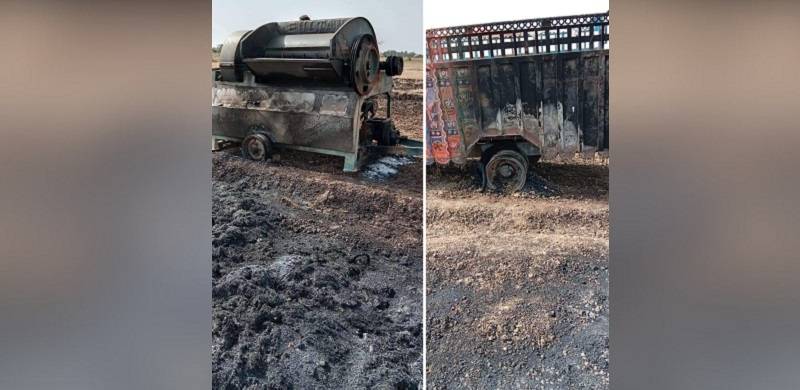
A woman belonging to the Nasirabad district of Balochistan on Saturday called upon the government to take action against a powerful tribal mob that burnt her crop to ashes.
In a video, posted on Twitter, the elderly lady could be heard narrating the details of the fire that burned the wheat crop spread on 16 acres, naming a number of people that she accused of perpetrating it.
According to the woman, the culprits also burned down two of the vehicles used for farming on the land.
The powerful tribes of Balochistan often subject the weak to oppressive measures to pressure them and keep them under their control.
On March 10, a judicial magistrate in Quetta granted bail to a Balochistan minister, Sardar Abdul Rehman Khetran in the Barkhan triple murder case, citing ‘lack of evidence’.
Approving the bail, Sessions Judge Malik Sujhao Din ordered the accused to submit surety bonds worth Rs500,000.
After the hearing, Khetran’s counsel Manzoor Rehmani told media persons that no charges were proved against his client.
The victims were held captives since 2019 in one of such prisons, allegedly run by Khetran, a leader of the government ally Balochistan Awami Party.
The Levies force had conducted raids in three different districts to recover the victims. East Balochistan and South Punjab were the locations of the operation.
Levies officials said at the time that the kidnappers tried to shift two abducted kids to Punjab, but their attempt was thwarted by the force.
Khetran was subsequently arrested for his alleged involvement in the killing and the hiding of the bodies.
In Balochistan, it seems that justice has always remained a mystery for the masses because the perpetrators are supported by the ‘powers’ that no one can challenge. Resultantly, a sense of deprivation is taking deep roots among the youth and women, which is fueling the ongoing insurgency in the ‘never-eyed’ province.
In a video, posted on Twitter, the elderly lady could be heard narrating the details of the fire that burned the wheat crop spread on 16 acres, naming a number of people that she accused of perpetrating it.
According to the woman, the culprits also burned down two of the vehicles used for farming on the land.
The powerful tribes of Balochistan often subject the weak to oppressive measures to pressure them and keep them under their control.
On March 10, a judicial magistrate in Quetta granted bail to a Balochistan minister, Sardar Abdul Rehman Khetran in the Barkhan triple murder case, citing ‘lack of evidence’.
Approving the bail, Sessions Judge Malik Sujhao Din ordered the accused to submit surety bonds worth Rs500,000.
After the hearing, Khetran’s counsel Manzoor Rehmani told media persons that no charges were proved against his client.
The victims were held captives since 2019 in one of such prisons, allegedly run by Khetran, a leader of the government ally Balochistan Awami Party.
The Levies force had conducted raids in three different districts to recover the victims. East Balochistan and South Punjab were the locations of the operation.
Levies officials said at the time that the kidnappers tried to shift two abducted kids to Punjab, but their attempt was thwarted by the force.
Khetran was subsequently arrested for his alleged involvement in the killing and the hiding of the bodies.
In Balochistan, it seems that justice has always remained a mystery for the masses because the perpetrators are supported by the ‘powers’ that no one can challenge. Resultantly, a sense of deprivation is taking deep roots among the youth and women, which is fueling the ongoing insurgency in the ‘never-eyed’ province.

